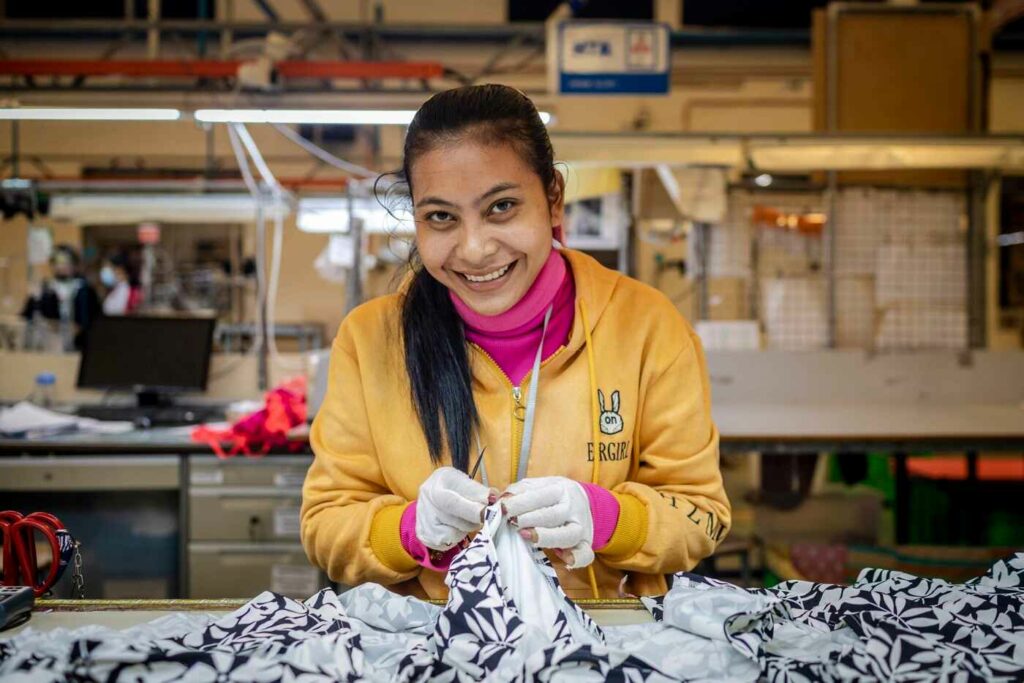PHNOM PENH – Soriya* is a worker in one of the garment factories receiving services from Better Factories Cambodia that has recently transitioned to digital wages. For many garment workers, adapting to this new way of receiving wages has been challenging. Still, the ongoing transition has the potential to improve workers’ financial literacy and make their life easier and safer.
“I lost my wallet. It was in 2019. After getting paid, I had put my wages in my wallet,” Soriya* says. “Then, I went to a nearby market to buy food. When I got home, I noticed that my wallet had been stolen. At that time, salary was paid with cash, unlike now. My whole month salary disappeared. I was distraught and cried heavily because I had no money to pay rent or send to my mother and child.”
In the global garment industry, the transition to digital wages is accelerating. Digital wage payments are increasingly recognised as faster, more transparent and efficient. They also may contribute to empowering workers, especially women workers, by enhancing their control over household financial decisions.
Until recently, Cambodia’s garment industry had one of the lowest rates of adoption of digital wage payments compared to global garment competitors. Nearly one million workers are employed in the sector, 80% of whom are women. Around half of these workers are still receiving their wages, twice per month, in cash.

But things are changing.
Over the past five years, the financial sector has rapidly evolved in the country. The COVID-19 pandemic accelerated the digitization of payments —like elsewhere—in an attempt to minimize human interactions during financial transactions.
“The time is right on both workers and employers’ sides to have a collective push towards a higher penetration and use of digital wages,” says Ken Loo, General Secretary of Textile, Apparel, Footwear, Travel Goods Association in Cambodia. “In the beginning, we met with a lot of resistance, but now, more and more factories are convinced that digital wage payments are a more efficient way to pay salaries.”
Better Factories Cambodia, in collaboration with the ILO Global Centre on Digital Wages for Decent Work and TAFTAC, is implementing activities to promote a responsible transition from cash to digital wage payments. Wages more broadly are one of Better Work’s eight strategic priorities for the next five years (2023-2027).
Evidence from countries where such transition is advancing suggests benefits for both employers and workers. The time-consuming process of payday cash payments is eliminated, and the workers’ vulnerability to theft outside the factory premises, or in their rooms, is reduced.
“Before, the whole payment process from collecting the cash from the bank to preparing it lasted four hours, without counting its one-on-one disbursement. This amounted to a big loss of production time,” says Sok Hout, HR Manager with Rong Win Factory in Phnom Pen, one of the pioneers in the digital wage payment system. “This system is not only more efficient, but it is also more accurate and reliable, as everything is tracked and backed up. These are very crucial elements to consider when pondering whether to move on to digital wages.”
In Rong Win Factory, the HR department facilitated the opening of bank accounts and distribution of bank cards to each of its some 800 workers. It also explained how to use the new system and educated the workers on how to keep their accounts safe, including not to share their account pin code with anyone.
In this case, the employers cover the account opening set up fees and the workers cover the annual maintenance fees.
The first concern of the workers was to understand the change.

“They are used to have money in their pocket, and now they need to learn that someone is keeping their money on their behalf in a bank account,” says Kong Athit, President of the Coalition of Cambodian Apparel Workers’ Democratic Union (CCAWDU). “They don’t understand why they need to change system as everything they do in their lives is done in cash.”
While the infrastructure needed to support digital payments is accelerating in Cambodia, the adoption by communities is lagging behind. Workers’ regular expenses such as food, rent and utilities are still expected to be paid in cash. This leads many workers to cash out wages in full at ATMs or money agents on or soon after payday.
“This is going to be the future and we must adapt to it,” CCAWDU President Athit says, adding that about 60 percent of his 50,000 affiliates were currently being paid digitally, but not all of them owned a smart phone and those who did, often lacked the skills to use it properly. “The successful wages digitalization process in Cambodia also goes together with the factories’ proximity to banks and ATMs. The latter are increasing in number, but they must urgently increase further.”
The presence of ATMs is still limited in the provinces, with workers needing to travel up to half an hour to collect their money. Also in the capital, many workers are seen queueing at ATMs when withdrawing their salaries.
“It is so crowded at ATM counters on payday,” Heng*, a garment worker says. “I am afraid that the ATM might not work or run out of money.”
Still, others started seeing the new wage payment system as an opportunity for saving, and in a safe manner,
“When we use a bank account, we don’t want to spend on things that are not important, that is why we can save. Before, we never had any money left at the end of the month,” Rithy*, a garment worker now receiving digital payments says. “We can save at least US$ 10 to US$ 100 over some months.”
Better Work partner brands have geared up to support the transition to digital wages across the country. PVH is currently partnering with Mastercard, the Mastercard Center for Inclusive Growth and the Business for Social Responsibility (BSR) HERproject on digital wage programmes with their local suppliers.
“The programme is empowering workers, especially women, to manage their own money. It is creating an opportunity to enable workers to approach benefits from digital financial services such as savings and remittances,” said Thi Thu Huong Hoang, a PVH associate working on the programme.
Such programmes can also help women improve their control over household financial decisions.
Engaging workers and their unions in dialogue and negotiations on the transition to digital wages is another key element to address the challenges posed by the transition.
Horn Kimhok, General Secretary of the Cambodian Federation of Independent Trade Union (CFITU) says that most of his 20,000 affiliates, and specifically in the garment sector, were paid digitally, with most of their factories located in Phnom Penh.
“The majority of the workers we deal with are digitally literate,” says Kimhok. “They already have a Facebook account and use digital platforms. More technology-skilled workers help explain the process to the ones who don’t know, supporting the factory and the HR department in this.”

In many of the world’s heavyweight garment production hubs, garment workers have shown an initial reluctance to the adoption of digital wage payments. However, once this method is fully implemented in their factories, in a responsible manner, the consensus changes, with the majority preferring not to return to cash payments.
Cambodia is no exception. With the use of digital wage payments gaining momentum, an increasing number of workers will be more likely included in the formal financial market.
“If I had a bank account, I would keep my money in it,” said Kiri* a worker that does not yet have access to digital payments. “But now, I just don’t have it yet.”
*Starred names have been changed.